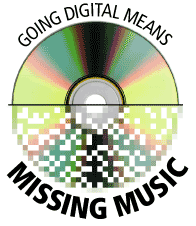 MP3s, bad because they have less music in them. So much less music, in fact, that your brain loses the ability to feel emotions listening to them. Okay, sure, over-compressed MP3s sound awful, especially at lower bitrates. But get ready for some strange psychoacoustics here, folks.
MP3s, bad because they have less music in them. So much less music, in fact, that your brain loses the ability to feel emotions listening to them. Okay, sure, over-compressed MP3s sound awful, especially at lower bitrates. But get ready for some strange psychoacoustics here, folks.
Producers howl over sound cut out by MP3 compression (and I see, while I was sitting on this, it got slashdotted, though no one took the bait
As Joel Selvin writes for the The San Francisco Chronicle, MP3s have less music:
…the music contained in these computer files represents less than 10 percent of the original music on the CDs.
Wow, I knew that compressed digital audio files contained less data, but less music?
In its journey from CD to MP3 player, the music has been compressed by eliminating data that computer analysis deems redundant, squeezed down until it fits through the Internet pipeline.
Of course! If they didn’t, we might stop up the tubes that make the Internet — or … um … one tube, apparently. (No wonder congestion is bad if we have just one pipeline! You need it to fit!) And there’s more:
When even the full files on the CDs contain less than half the information stored to studio hard drives during recording, these compressed MP3s represent a minuscule fraction of the actual recording.
The humanity! All those years when we were buying CDs, we were only getting half of what was recorded in the studio?! Why, that must mean they’re recording, say, four whole tracks when they record the album. And one take. (Okay, I’m assuming they somehow got this statistic by assuming 96kHz sample rates … except that’s not really half the amount of data … and that would still require 16-bit … and I don’t know who told them that, anyway.)
There are the obligatory and predictable quotes from Phil Ramone and others. I can understand engineers being squeamish about someone listening to a low-bitrate MP3 on iPod earbuds, though I wonder how they missed people taping pennies to their turntables in the 60s. (Scratches and dust, I suppose, just give you more music!)
You’ve read these kinds of articles before. They’re not entirely wrong, they just struggle to explain what lossy compression is. A journalist, I can imagine, would do that easily; I haven’t written any compression algorithms this morning so I’ll admit my own understanding of data compression is rudimentary. But, of course, what a journalist should do is talk to experts, and you hope they’ll tell you something that makes sense. In this case, they seem to explain away our ability to hear music at all. Get ready for — experts gone crazy!
Gasp at speaker designers who call into question our ability to hear digital audio — AT ALL! John Meyer, from Meyer Sound Labs:
“It turns you into an observer,” Meyer says. “It forces the brain to work harder to solve it all the time. Any compression system is based on the idea you can throw data away, and that’s proved tricky because we don’t know how the brain works.”
Go ahead. Listen to a digital audio file — right now. I don’t understand it. I have no idea what’s going on. Are you even hearing music? Who knows?
What’s missing here, of course, is the acknowledgment that the digital audio file itself also “throws away data”, because the real world doesn’t have samples. For that matter, this whole argument seems to result from a century of gradually losing the ability to distinguish between a recording and live sound. Part of the reason people are so upset by digital audio compression, even if it’s lossless, may be because people have an artificial attachment to the recording itself. But don’t tell that to people who engineer records and design speakers.
People are so desperate to prove that digital recordings are somehow evil that they even turn to research to prove that your brain on digital files stops feeling emotions:
It could be that MP3s actually reach the receptors in our brains in entirely different ways than analog phonograph records. The difference could be as fundamental as which brain hemisphere the music engages.
“Poorer-fidelity music stimulates the brain in different ways,” says Dr. Robert Sweetow, head of the University of California-San Francisco audiology department. “With different neurons, perhaps lesser neurons, stimulated, there are fewer cortical neurons connected back to the limbic system, where the emotions are stored.”
I expect that’s true — of 64kbps MP3s played through, say, a tin can. Welcome to the age of recordings: we sacrifice superior formats for inferior formats, yes, as higher-fidelity CDs give way to copy protection-laden, incompatible, inflexible, lossy compressed files. But then people get so upset that they throw out any understanding of the actual music in favor of the recording, artificially elevate old records without any real basis, call into question the basic idea of data compression even though its popularity demonstrates that it can work.
Here’s a suggestion: what about what gets thrown out when you go from a live performance to a recording? I love listening to records. I have strong feelings listening to records. (Erm, digital files.) But I’ll bet most people’s limbic systems get the biggest rush when they hear something live.
Oh, well, at least all of this should make Bob Dylan happy. If “new records have sound all over them”, and MP3s “take out some of the music,” does that mean the resulting record has the right amount of sound on it? You know, like taking your finger and wiping extra jam off of toast?